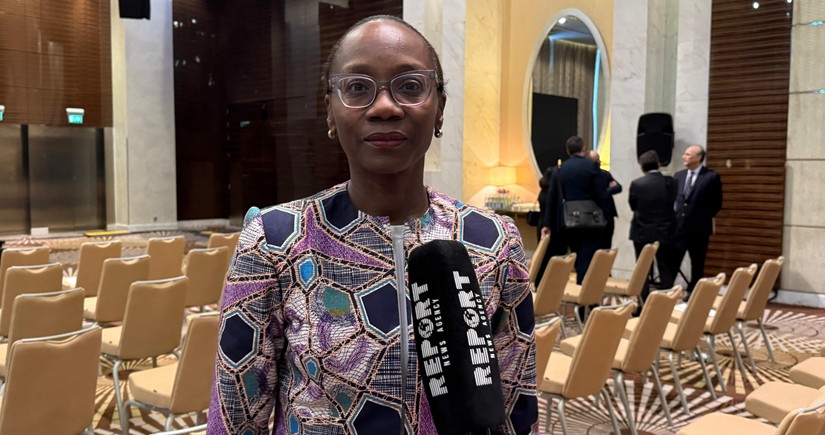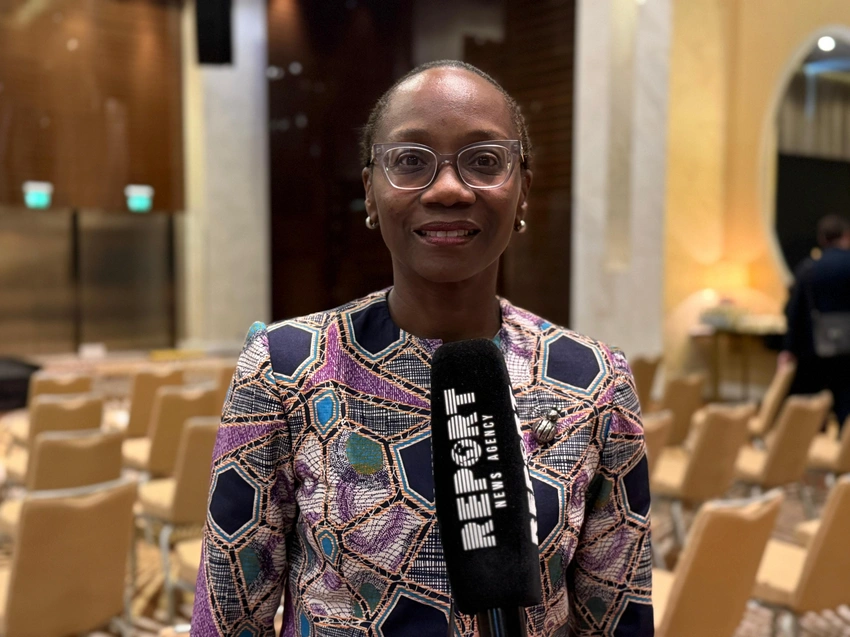Regional director: WB ready to invest in Azerbaijan’s green transition - INTERVIEW
- 12 June, 2025
- 12:49

In the context of ongoing efforts to build a sustainable and diversified economy, Azerbaijan is actively expanding cooperation with international financial institutions. The World Bank, as one of the country's key partners, provides comprehensive support in the areas of economic reforms, energy transition, digitalization and development of transport infrastructure. At the beginning of 2025, a new strategic document was approved - the Country Partnership Framework (CPF), which defines the priorities of joint work for the coming years.
Rolande Pryce, World Bank regional director for the South Caucasus, told Report about the key areas of the new stage of cooperation, challenges and opportunities for Azerbaijan in the field of economic diversification, private sector development, green energy and digital technologies.
Report presents the interview:
- What are the key priorities of the World Bank's new Country Partnership Framework with Azerbaijan, and how does it differ from previous strategies?
- The Board of Directors of the World Bank Group endorsed our new partnership document with Azerbaijan in January 2025. Through this Country Partnership Framework, or simply CPF, we aim to support Azerbaijan’s transition to a more competitive, greener, and inclusive economy, by focusing on key priorities of improving productivity and creating better jobs and enhancing resilience and sustainability. This entails a broad range of activities to enhance the business environment, support job creation, foster enterprise development, ensure sustainable finance, strengthen transport and digital connectivity, accelerate energy transition, and enhance adaptation to climate change. The CPF differs from previous strategies due to its stronger emphasis on:
- Accelerating the shift to renewable energy and enhancing climate change adaptation.
- Diversifying the economy away from the hydrocarbon sector and investing in sectors with high growth potential, such as technology, agriculture, and renewable energy.
- Deepening the private sector as key engine for growth and job creation.
Overall, the new CPF builds upon lessons learned from previous engagements and aligns with Azerbaijan's development strategy and World Bank’s global priorities. It prioritizes maximizing scale and impact by leveraging synergies among the International Bank for Reconstruction and Development (IBRD), International Finance Corporation (IFC), and Multilateral Investment Guarantee Agency (MIGA) to support policy reforms and enable private capital mobilization.
- What are the main economic challenges the World Bank sees in Azerbaijan, and how will the new strategy help overcome them?
- Through a rich body of analytical work - the Systematic Country Diagnostic (2022), the Country Economic Memorandum (2022) and the Country Climate and Development Report (2023) - carried out in consultation with the government, the World Bank has identified Azerbaijan’s key existing and emerging economic challenges. Put succinctly the country remains overly dependent on the hydrocarbon sector and there continues to be a significant state presence in the economy.
The World Bank Group's new Country Partnership Framework for Azerbaijan aims to support the country's transition to a more competitive and inclusive economy. To diversify the economy beyond the hydrocarbon sector, the CPF will strengthen energy infrastructure, attract private investment in renewable energy, and advance climate-resilient urban ecosystems, water efficiency and security, and promote climate-smart agriculture practices that are important for people’s livelihoods, prosperity, and jobs. To address inefficiencies in state-owned enterprises and the overall issue of competitiveness of Azerbaijan’s firms, the CPF will aim to improve Azerbaijan’s business environment, support job creation and enterprise development, enhance access to finance, develop the Middle Corridor, and improve digitalization.

- How does the World Bank assess the current level of economic diversification in Azerbaijan, and what steps are needed for its further development?
- The World Bank acknowledges that Azerbaijan's economy has historically been heavily reliant on the oil and gas sectors. I am also pleased to note that there has been a concerted effort to diversify the economy and reduce this dependency. Moving forward, we recommend a few important things:
Firstly, stepping up investments in human capital. Successful economies invest in people. To build a workforce capable of driving diversified economic growth, Azerbaijan will need more and better human capital that will require a continued strong focus on improving education outcomes and skills development.
Secondly, continued efforts to improve the investment climate are essential. This includes regulatory reforms, enhancing transparency, and reducing barriers to business operations.
Thirdly, developing the agribusiness sector and other non-oil industries is critical. This involves improving access to finance, supporting value chains, and investing in infrastructure.
Finally, facilitating private sector-led growth will allow Azerbaijan to take advantage of new opportunities, such as new markets and technological breakthroughs.
By focusing on these areas, Azerbaijan can build a more resilient and diversified economy that is less dependent on oil and gas revenues.
- What reforms are needed to improve the business environment, and how will the World Bank support their implementation?
- To improve the business environment in Azerbaijan requires a mix of policy and regulatory reforms and investments that the World Bank Group can support through technical assistance and financing. In general, implementing policies that foster competition and protect property rights, improving access to finance for micro, small, and medium-sized enterprises (MSMEs) by expanding financing options and reducing the financing gap, developing innovative financing platforms and mechanisms to support smaller businesses; and investing in critical infrastructure such as transport, digital connectivity, and energy will create a conducive environment for private sector development.
- The document mentions support for Middle Corridor development. What specific projects does the World Bank intend to finance in this direction?
- The World Bank has been actively involved in supporting the development of the Middle Corridor, a key trade route connecting China to Europe through Central Asia, South Caucasus, and Türkiye. We work with all countries along the corridor through investments, analytics, and advisory services. Recently, we completed a major study on the Middle Corridor that found that a combination of investments and efficiency measures can reduce travel times along the corridor by half and triple trade flows by 2030. As you know, World Bank in the past financed a major highway and railway program in Azerbaijan that is now successfully used to transport goods through Azerbaijani segment of the corridor. We are committed to building on this successful cooperation and supporting Azerbaijan in the operationalization of this corridor. One of the potential areas for future investment collaboration could be the expansion of Port of Baku. We are currently in discussion with our counterparts and will provide more information to the public in due course.
- How does the World Bank assess Azerbaijan's potential in digitalization, and what measures will be taken to accelerate the adoption of artificial intelligence and other technologies
- The World Bank acknowledges Azerbaijan's efforts to enhance its digital infrastructure and regulatory framework for the future and has been instrumental in supporting these efforts. I was delighted when the Minister of Digital Development and Transport of Azerbaijan recently acknowledged and expressed his appreciation for the World Bank Group’s technical assistance (facilitated by financing from the European Union) which contributed to the formulation of the country’s digital development strategy. We supported the preparation of the Azerbaijan Rural Digital Needs Assessment that highlights the technological challenges and opportunities faced by various Azerbaijani communities in using digital tools and services. You may recall the recently closed Judicial Services and Smart Infrastructure Project financed by the World Bank, which among other things, improved the delivery of judicial services for citizens and businesses with investments in e-courts and the digitization of judiciary processes.
Through recent technical assistance engagements, the World Bank and IFC have outlined several measures to accelerate the adoption of artificial intelligence and other transformative digital technologies in Azerbaijan. These include building robust AI foundations, digital infrastructure development, promoting private sector participation, and capacity building. By focusing on these areas, Azerbaijan can harness full potential of these new technologies for its development.
- What specific renewable energy projects, besides AZURE, is the World Bank considering supporting in Azerbaijan?
- In March we approved the Azerbaijan Scaling-Up Renewable Energy Project (AZURE) with a $173.5 million loan. The primary objective of this project is to enable renewable energy integration and ensure stability in Azerbaijan’s power grid. By doing so the project will help to strengthen Azerbaijan’s energy security by providing the enabling conditions for the private sector to invest in Azerbaijan’s renewable energy potential. This project is a first investment in support of Azerbaijan’s vision of creating a green energy corridor, an initiative to increase renewable energy development and trade among regional players and beyond.

This is only the beginning of the World Bank's broader strategy to support sustainable infrastructure development and improve the integration of renewable energy sources in Azerbaijan and the interconnection with renewable energy generators and demanders within and beyond the South Caucasus.
- What is the total amount of World Bank financing under the new partnership program? What financing conditions will be offered to Azerbaijan, and will grants or concessional loans be available?
- There is no formal limit on the amount of financing that the World Bank Group can provide to Azerbaijan under the new Country Partnership Framework. The World Bank offers a mix of instruments, in general our loans from IBRD are concessional when compared with commercial banks and we offer guarantees that usually attract financing at rates that are more concessional than the government would attract on its own due to the World Bank’s AAA rating. Of course, the actual lending amount will depend on the country’s demand for financing and the appetite of the private sector for solutions that IFC and MIGA can provide.
Regarding conditions of our financing, as you know, Azerbaijan is an upper-middle income country, may have a slightly higher interest rate than a low-income borrowing member of the World Bank, but let me reiterate that World Bank financing is more concessional that that which could be raised by the government from commercial banks. Most importantly, our financing is coupled with the World Bank Group’s deep technical expertise, analytics and technical assistance and this in my view is the real value of the World Bank Group for Azerbaijan. My government counterparts have reiterated time and time again that World Bank’s knowledge, deep technical expertise, and global experience is at the heart of long and fruitful our partnership.
